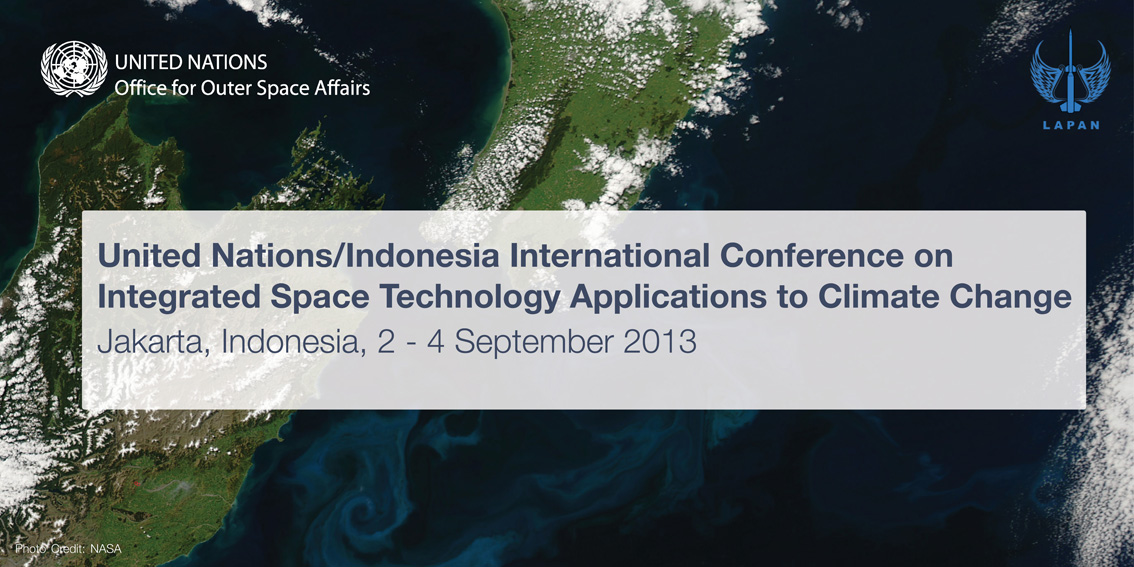United Nations Office for Outer Space Affairs (UNOOSA) and National Institute of Aeronautics and Space (LAPAN)
 Introduction
Introduction
The United Nations organized the United Nations/Indonesia International Conference on Integrated Space Technology Applications to Climate Change under the framework of the United Nations Programme on Space Applications. The Conference took place in Jakarta, Indonesia, from 2 to 4 September 2013, at Borobudur Hotel, hosted by the National Institute of Aeronautics and Space (LAPAN).
This International Conference brought together experts from the space and the climate change community as well as decision makers to discuss methods to use space-based applications to support the identification and implementation of adaptation measures, as well as to share experiences and lessons learned on the use of such applications in the context of mitigation.
“Adaption” was centered as one of the cornerstones for a strengthened future response to climate change in the Bali Action Plan, adopted at the Conference of State Parties 13 (COP 13) in December 2007. In focus is the sustainable and continuing cooperation and achievements in order to effectively and entirely strengthen the implementation process of the Framework Convention on Climate Change (UNFCCC) beyond 2012. During COP 15 in Copenhagen the Conference took note of the necessity to create a comprehensive adaption programme. The signatories, among them Heads of State, Heads of Government and Ministers, agreed that urgent action and global cooperation on adaption is needed. Finally at the Cancun Climate Change Conference in December 2010 the parties agreed upon and created the Cancun Adapation Framework (CAF) with the focus of improving and emending actions on adaption. Important fundamentals of the CAF comprehend a work programme to address loss and damage from climate change, preparation of National Adaptation Plans by the Least Developed Countries, and the formation of an Adaptation Committee within the UNFCCC.
In December 2011 the parties improved the implementation of the CAF by agreeing on: Modalities, procedures and composition of the Adaptation Committee; Activities to be undertaken under the work programme on loss and damage and Modalities and guidelines for the national adaptation plans. United Nations/Indonesia International Conference on Integrated Space Technology Applications to Climate Change will bring together representatives from the space and climate change communities; from Member States and from national, regional, and international organizations to become aware of the most recent advances in the use of space applications to target the challenges posed by climate change and to discuss strategies to improve the utilization of such applications particularly in countries experiencing the impacts of climate change.
Background and Objectives
In recent years, Climate Change has been recognized as a process which may deter sustainable development throughout the world. As a global phenomenon, climate change poses a threat to the economic, social, and environmental dimensions of sustainable development. In the context of peaceful uses of outer space, governments reiterated the need to protect the Earth’s environment, and to promote international cooperation on the use of satellite applications for such topics as climate change. Satellites offer a unique point of view to observe climate change-related variables and features at the global level such as sea-level rise, deforestation trends or carbon emissions; and to measure on a permanent basis other parameters which may be too difficult or costly to observe from the ground such as changes in polar ice-caps and glaciers, and social trends such as increasing exposition of vulnerable communities to phenomena related to Climate Change. The objectives of this International Conference were:
1) To discuss ways in which countries affected by climate change can make better use of space applications to assess vulnerability to climate change.
2) To identify potential alternatives in the context of mitigation and adaption to climate change
3) To improve synergies among space agencies and organizations targeting efforts on climate change.
4) To strengthen international and regional cooperation in this area.
5) To raise awareness on the recent advances in space-related technologies, services and information resources which can be use to assess the impacts of climate change and the effects of measures implemented to reduce such impacts.
Participants
The International Conference brought together participants from national, regional, and international organizations from:
- Government agencies including ministries of environment, health, natural resources, space agencies.
- National, regional and international organizations involved in climate change studies.
- Academic and research institutions.
- Non-governmental organizations.
- Private Sector and industries.
Points of Contact
UNOOSA Juan-Carlos Villagran UN-SPIDER Office for Outer Space Affairs United Nations Office in Bonn Tel : +49 (0) 228 815-0682 Fax: +49 (0) 228 815 0699 E-mail: juan-carlos.villagran [at] unoosa.org
LAPAN Agus Hidayat National Institute of Aeronautics and Space of Indonesia (LAPAN) Jakarta-Indonesia Tel: 62-21-8717716 Fax: 62-21-8722733 E-mail: agushidayat [at] lapan.go.id
Presentations
All Conference presentations are available on UNOOSA's website.
| Attachment | Size |
|---|---|
| Flyer OOSA/LAPAN Climate Change Conference.pdf | 605.83 KB |
| Information Note OOSA/LAPAN Climate Change Conference | 72.25 KB |
| Working Groups | 424.09 KB |
| Programme | 358.16 KB |
| Useful Information for Participants | 628.98 KB |
